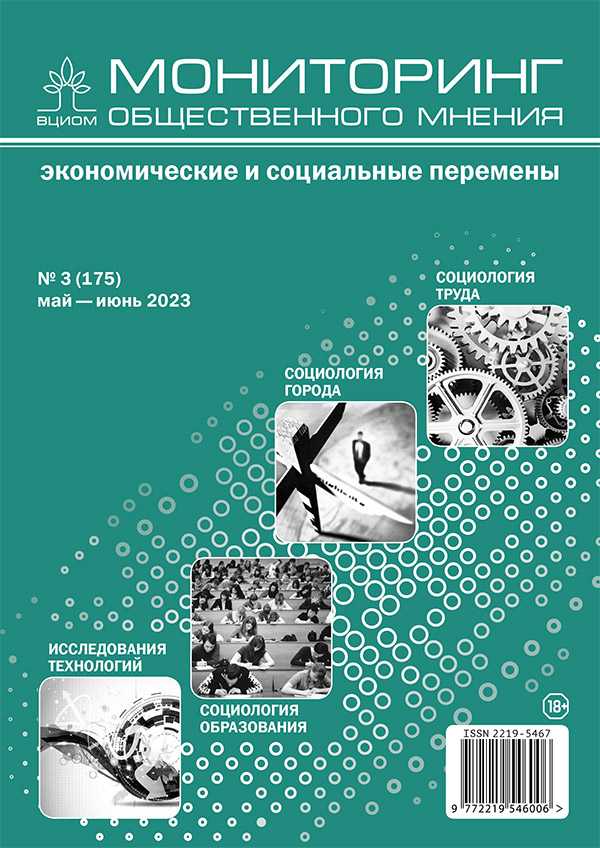Feminist Wave in South Korean Women’s Cinema
DOI:
https://doi.org/10.14515/monitoring.2023.3.2333Keywords:
feminist wave, South Korean cinematography, representation of gender inequality, women directorsAbstract
The article is devoted to a sociological analysis of the representation of gender inequality in the films of female directors Yoon Ga-eun, Jeon Go-woon, Kim Bo-ra, and Kim Do-young. The democratization of social life in the Republic of Korea has led to the inclusion of women directors in cinematographic processes. Women filmmakers born in the 1980s focused on representing gender relations through a feminist lens rather than the stereotypes and cultural standards still prevalent in South Korea. The films of these directors formed a modern feminist wave in South Korean cinema. In the films analyzed, the directors address the issues of the socialization of girls, the ingrained practice of preference for sons, gender inequality in the family and society, and the self-determination of women in society. The theoretical framework of the study was feminist concepts in film study and cultural studies in sociology. The article shows that female directors of the feminist wave leave open the question of the future of gender inequality in South Korean society, outlining conflicting perspectives.
References
Агафонова Н. А. Общая теория кино и основы анализа фильма. Минск: Тесей, 2008.
Agafonova N. A. (2008) General Film Theory and the Fundamentals of Film Analysis. Minsk: Tesey. (In Russ.)
Артюх А. Кинофеминизм: женщины-режиссеры ХХI века (Основы кинокритики). СПб.: Петрополис, 2018.
Artyukh A. (2018) Cine-Feminism: Women Directors of the 21st century (Fundamentals of the Film Criticism). Saint Petersburg: Petropolis. (In Russ.)
Здравомыслова Е. А., Тёмкина А. А. 12 лекций по гендерной социологии. СПб.: Издательство Европейского университета в Санкт-Петербурге, 2015.
Zdravomyslova E. A., Temkina A. A. (2015) 12 Lectures on Sociology of Gender. Saint Petersburg: EUSP Press. (In Russ.)
Кирьянов О. В. Южная Корея. М.: РИПОЛ-классик, 2021.
Kiryanov O. V. (2021) South Korea. Moscow: Ripol Classic Publishing House. (In Russ.)
Корте Г. Введение в системный киноанализ. М.: Издательство Высшей школы экономики, 2018. https://doi.org/10.17323/978-5-7598-1103-9.
Korte H. (2018) Einführung in die Systematische Filmanalyse. Moscow: HSE Publishing House. https://doi.org/10.17323/978-5-7598-1103-9. (In Russ.)
Ланьков А. Н. Корея: рывок в современность. Новосибирск: Издательство ИАЭТ СО РАН, 2021.
Lan’kov A. N. (2021) Korea: A Breakthrough into the Present. Novosibirsk: Institute of Archaeology and Ethnography Siberian Branch of the Russian Academy of Sciences Publishing House. (In Russ.)
МакДональд К. Теория фильмов. Харьков: Гуманитарный центр, 2018.
McDonald K. (2018) Film Theory. The Basics. Kharkiv: Humanitarian Сenter. (In Russ.)
Модернизация Кореи: политика, экономика, общество, культура: коллективная монография / отв. ред. Р. К. Тангалычева. М.: ВЦИОМ, 2022.
Tangalycheva R. K. (ed.) (2022) Modernization of Korea: Politics, Economics, Society, Culture. Moscow: Russian Public Opinion Research Center. (In Russ.)
Нэм Джу Т. Госпожа Ким Чжи Ен, рожденная в 1982 году. М.: Эксмо, 2016.
Cho N.-J. (2016) Palsip Yi Nyeon Saeng Kim Jiyeong. Moscow: Eksmo. (In Russ.)
Тангалычева Р. К. Молодежные проблемы в южнокорейском кинематографе (на материале фильма Ли Чхандона «Пылающий») // Вестник Санкт-Петербургского университета. Социология. 2022. Т. 15. № 2. С. 155—171. https://doi.org/10.21638/spbu12.2022.204.
Tangalycheva R. K. (2022) Youth Problems in South Korean Cinema (On the Material of Lee Chang-don’s Film “Burning”). Vestnik of Saint Petersburg University. Sociology. Vol. 15. No. 2. P. 155—171. https://doi.org/10.21638/spbu12.2022.204. (In Russ.)
Тюдор Д. Невозможная Корея: К-POP и экономическое чудо, дорамы и культура на экспорт, феминизм по-азиатски и гендерные роли Дальнего Востока. М.: АСТ, 2019.
Tudor D. (2019) Korea. The Impossible Country. South Korea’s Amazing Rise from the Ashes: The Inside Story of an Economic, Political and Cultural Phenomenon. Moscow: AST. (In Russ.)
Усманова А. От локального к глобальному: политика «культурных исследований» (международная конференция по Cultural Studies в Бирмингеме) // Топос. 2000. № 3. C. 161—165.
Usmanova А. (2000) From Local to Global: The Policy of “Cultural Research”. Topos. No. 3. P. 161—165. (In Russ.)
Хван А. Г. Очерки истории корейского кино (1903—2006). М.: Litres, 2021.
Khvan A. G. (2021) Essays on the History of Korean Cinema (1903—2006). Moscow: Litres. (In Russ.)
Хонг Ю. Корейская волна: как маленькая страна покорила весь мир. М.: Бомбора, 2021.
Hong E. (2021) The Birth of Korean Cool: How One Nation Is Conquering the World Through Pop Culture. Moscow: Bombora. (In Russ.)
Ярская-Смирнова Е. Р. Гендер, власть и кинематограф: основные направления феминистской кинокритики // Журнал социологии и социальной антропологии. 2001. Т. 4. № 2. С. 100—118.
Iarskaia-Smirnova E. R. (2001) Gender, Power, and Cinema: The Main Directions of Feminist Film Criticism. The Journal of Sociology and Social Anthropology. Vol. 4. No. 2. P. 100—118. (In Russ.)
Kaplan E. A. (ed.) (2000) Feminism and Film. Oxford: Oxford University Press.
Lee S. (ed.) (2019) Rediscovering Korean Cinema (Perspectives on Contemporary Korea). Ann Arbor, MI: The University of Michigan Press.
Mulvey L. (1975) Visual Pleasure and Narrative Cinema. Screen. Vol. 16. No. 3. P. 6—18. https://doi.org/10.1093/screen/16.3.6.
Mulvey L. (2009) Visual and Other Pleasures. London: Palgrave Macmillan.
Nichols B. (1995) Blurred Boundaries: Questions of Meaning in Contemporary Culture. Bloomington, IN: Indiana University Press.
Penley C. (ed.) (1988) Feminism and Film Theory. New York: Routledge. https://doi.org/10.4324/9780203699362.
Downloads
Published
How to Cite
Issue
Section
License
Copyright (c) 2023 Monitoring of Public Opinion: Economic and Social Changes Journal (Public Opinion Monitoring) ISSN 2219-5467

This work is licensed under a Creative Commons Attribution-NonCommercial-ShareAlike 4.0 International License.






